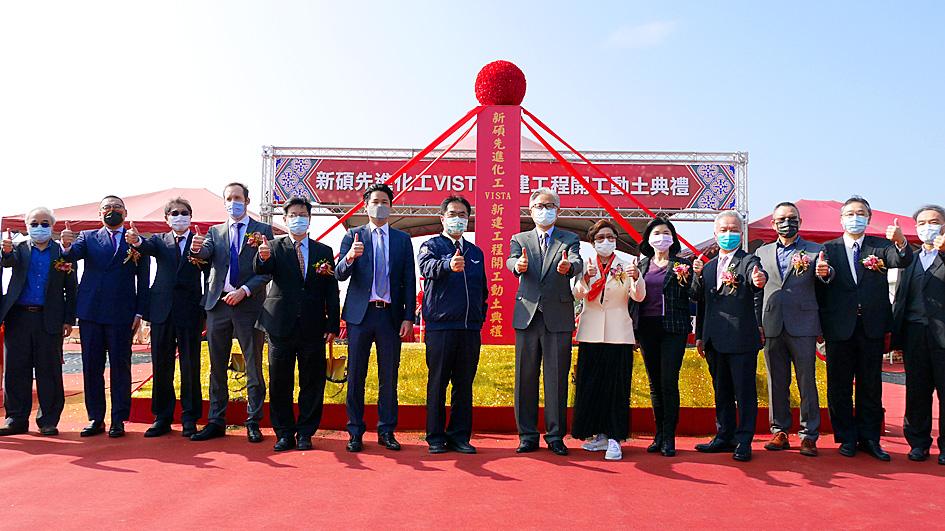Shinkong Synthetic Fibers Corp’s (新光合成纖維) electronic-grade chemical agent manufacturing venture with Solvay Group, Shinsol Advanced Chemical Corp (新碩先進), held a groundbreaking ceremony yesterday for its first fab in Tainan, where Taiwan Semiconductor Manufacturing Co (TSMC, 台積電) operates one of its most advanced chip manufacturing fabs.
It is the latest in a string of efforts by Shinkong Synthetic to expand into the nation’s rapidly growing semiconductor industry.
Shinkong Synthetic Fibers, Shin Kong Group (新光集團)’s polyethylene terephthalate polymer material manufacturing arm, has been expanding its business scope to optical films, brightening films and other films used in LCD manufacturing.

Photo: Fang Wei-jie, Taipei Times
Shinsol Advanced Chemical, a half-half venture between Shinkong Synthetic and Solvay, said the fab would have an initial production capacity of 36,287 tonnes of grade 5 hydrogen peroxide a year.
The chemical agent is used in wafer cleaning for cutting-edge semiconductor process technologies including 7-nanometer, 5-nanometer and 3-nanometer technologies.
The first phase of the factory is expected to begin operations in the first quarter of next year, Shinsol said.
The factory is in the Tainan Technology Industry Park (台南科技工業區), about a 30-minute drive from the Southern Taiwan Science Park (南部科學園區), a chip manufacturing hub in southern Taiwan.
“As Taiwan’s semiconductor industry is growing, the consumption of electronic chemicals used for wafer cleaning is increasing. Our goal is to become a crucial part of balancing the supply and demand of electronic-grade hydrogen peroxide,” Shinsol chairman Gregory Wu (吳昕岳) said during the groundbreaking ceremony.
Shinsol was created last year with an initial capital of NT$500 million (US$18.02 million).

On Ireland’s blustery western seaboard, researchers are gleefully flying giant kites — not for fun, but in the hope of generating renewable electricity and sparking a “revolution” in wind energy. “We use a kite to capture the wind and a generator at the bottom of it that captures the power,” said Padraic Doherty of Kitepower, the Dutch firm behind the venture. At its test site in operation since September 2023 near the small town of Bangor Erris, the team transports the vast 60-square-meter kite from a hangar across the lunar-like bogland to a generator. The kite is then attached by a

Foxconn Technology Co (鴻準精密), a metal casing supplier owned by Hon Hai Precision Industry Co (鴻海精密), yesterday announced plans to invest US$1 billion in the US over the next decade as part of its business transformation strategy. The Apple Inc supplier said in a statement that its board approved the investment on Thursday, as part of a transformation strategy focused on precision mold development, smart manufacturing, robotics and advanced automation. The strategy would have a strong emphasis on artificial intelligence (AI), the company added. The company said it aims to build a flexible, intelligent production ecosystem to boost competitiveness and sustainability. Foxconn

Leading Taiwanese bicycle brands Giant Manufacturing Co (巨大機械) and Merida Industry Co (美利達工業) on Sunday said that they have adopted measures to mitigate the impact of the tariff policies of US President Donald Trump’s administration. The US announced at the beginning of this month that it would impose a 20 percent tariff on imported goods made in Taiwan, effective on Thursday last week. The tariff would be added to other pre-existing most-favored-nation duties and industry-specific trade remedy levy, which would bring the overall tariff on Taiwan-made bicycles to between 25.5 percent and 31 percent. However, Giant did not seem too perturbed by the

TARIFF CONCERNS: Semiconductor suppliers are tempering expectations for the traditionally strong third quarter, citing US tariff uncertainty and a stronger NT dollar Several Taiwanese semiconductor suppliers are taking a cautious view of the third quarter — typically a peak season for the industry — citing uncertainty over US tariffs and the stronger New Taiwan dollar. Smartphone chip designer MediaTek Inc (聯發科技) said that customers accelerated orders in the first half of the year to avoid potential tariffs threatened by US President Donald Trump’s administration. As a result, it anticipates weaker-than-usual peak-season demand in the third quarter. The US tariff plan, announced on April 2, initially proposed a 32 percent duty on Taiwanese goods. Its implementation was postponed by 90 days to July 9, then